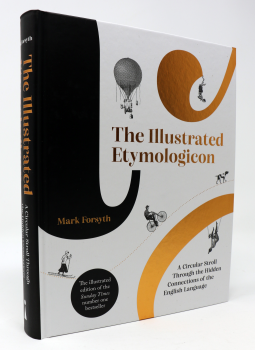Review: 'The Illustrated Etymologicon' by Mark Forsyth
Pub. Date: 11/04/2023
Publisher: Icon Books
*** A NEW, BEAUTIFULLY ILLUSTRATED HARDBACK EDITION OF THE SUNDAY TIMES NUMBER ONE BESTSELLER, PUBLISHED ON ITS TENTH ANNIVERSARY ***
The Etymologicon is an occasionally ribald, frequently witty and unerringly erudite guided tour of the secret labyrinth that lurks beneath the English language.
What is the actual connection between disgruntled and gruntled? What links church organs to organised crime, California to the Caliphate, or brackets to codpieces?
Mark Forsyth's riotous celebration of the idiosyncratic and sometimes absurd connections between words is a classic of its kind: a mine of fascinating information and a must-read for word-lovers everywhere.
This is the tenth anniversary of the original publication for The Etymologicon and its rerelease as an illustrated hardback surely gives some indication of its success. Forsyth's book is beloved for all the reasons I list below and even though I had already read it digitally years ago, I once again found myself delighted by it. While etymology might feel like one of those dry subjects old men with white beards engage in, Forsyth absolutely brings it to life in a way that is both accessible and erudite. You will definitely learn something from The Illustrated Etymologicon, but not just how certain words link or where they originate form. What I found most rewarding about the book is that it teaches you how to keep looking at things. A word may just seem a word, you use it everyday and you think you know what it means and is. But Forsyth shows that actually paying closer attention, pondering on things, drawing connections and doing research, is incredibly rewarding. This focused attention which the book teaches is also very valuable for life in general. Take your time with things, don't dismiss them as obvious, and find unexpected joy. Quite a takeaway from a book technically about language!
The Illustrated Etymologicon is dedicated to what Forsyth called the 'glorious insanities of the English language' (15) and it is therefore delightfully insane in its own way. Where usually I might describe the different sections of a book or its chapters or stories, it is simply impossible to do that for the Etymologicon. I mean, the second piece describes how gene pool came from a medieval French game of shooing a chicken. A much later section tells how the name Wendy came about due to J.M. Barrie and a young girl called Margaret. And did you know the phrase in the doghouse also comes from this play? As a Medievalist with a love for Old English I also enjoyed the section on 'The Five Fingers' which explains not just the word digital but also gives us all the Old English names for the different fingers. Guess which one the leech finger is! Another delightful aspect was Forsyth's commentary on Shakespeare having never met a map in his life (253), his incisive commentary on how prejudice influences language (110). and the saltiness of the Halcyon days. I also loved the little section on 'Coincidences & Patterns' and the nuance it provides between mere coincidences and the graft of philology and linguistics. It is nigh impossible to summarise a book like the Etymologicon, but suffice to say it is delightful, full of interesting information and facts, and funny writing.
Forsyth's writing remains delightful. At no point does The Illustrated Etymologicon feel like it's talking down to you or actively teaching you, and yet you definitely learn from it. Not only are there delightful facts to entertain a boring dinner party with, but there is also just the joy of finding connections where you didn't expect them. This illustrated edition is also absolutely stunning. Icon Books was kind enough to send me a physical review copy and it is simply stunning. Not only is the book design itself, with its swirling letters, big comma illustrations, and different typesetting, great, but the illustrations are also really well-done and well-placed. The illustrations have an old-timey feel to it without looking outdated and often made me laugh as they tend to highlight the funnier aspects of specific words or phrases. The Illustrated Etymologicon is like the "coffee table book" par excellence with its beautiful cover, book design, and illustrations, and I intend that as the highest compliment. It is beautifully done, with something exciting to see one very page. You can dip in and out of it over a coffee and a biscuit, or, like me, obsessively read through it in a few sittings.
I give this book...
5 Universes!
The Illustrated Etymologicon is indeed a lovely stroll through the English language, full of beautiful illustrations and stunningly designed. Mark Forsyth's writing remains insightful and funny, even ten years on, and I can't wait to get annoying again about etymological facts.




Comments
Post a Comment